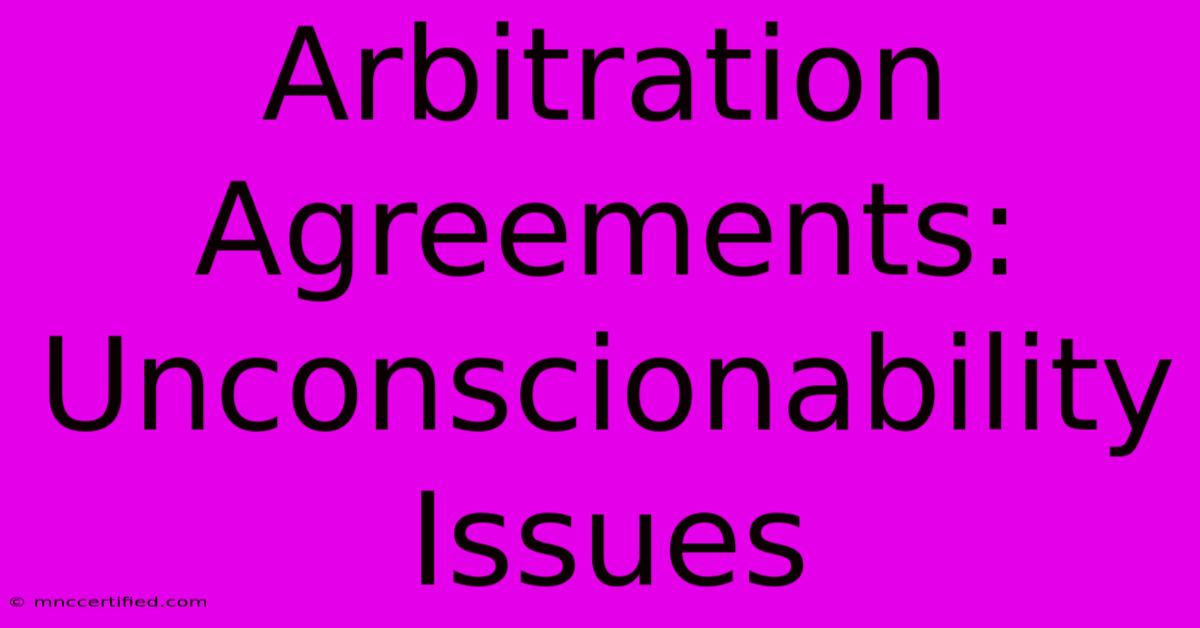Arbitration Agreements: Unconscionability Issues

Table of Contents
Arbitration Agreements: Unconscionability Issues
Arbitration agreements, increasingly common in contracts from employment agreements to consumer contracts, offer a seemingly efficient alternative to traditional litigation. However, the enforceability of these agreements hinges on their fairness and transparency. This article delves into the critical issue of unconscionability as it relates to arbitration agreements, exploring how courts determine unconscionability and the implications for businesses and consumers alike.
What is Unconscionability?
Unconscionability, in the legal context, refers to a contract or clause that is so unfair or one-sided that a court will refuse to enforce it. It's a doctrine rooted in fairness and equity, designed to prevent exploitation and protect vulnerable parties. To establish unconscionability, courts typically consider two key elements:
1. Procedural Unconscionability: The "How"
Procedural unconscionability focuses on the process by which the agreement was formed. It examines whether the agreement was presented fairly and whether the weaker party had a meaningful opportunity to negotiate its terms. Factors considered include:
- Oppression: Was the agreement presented on a take-it-or-leave-it basis, leaving the weaker party with no real choice?
- Surprise: Were the terms hidden in fine print, making it difficult for the weaker party to understand their implications?
- Lack of meaningful choice: Did the weaker party have the ability to negotiate terms, seek independent legal advice, or understand the consequences of signing the agreement?
2. Substantive Unconscionability: The "What"
Substantive unconscionability examines the terms of the agreement themselves. It asks whether the agreement's provisions are so one-sided or unfair as to shock the conscience. Examples include:
- Unreasonably low caps on damages: Limiting recovery for breaches to a trivially small amount.
- One-sided choice of forum: Requiring arbitration in a location inconvenient or inaccessible to the weaker party.
- Unilateral modification clauses: Allowing one party to unilaterally change the terms of the agreement.
- Confidentiality clauses that prevent public disclosure of disputes: These can silence complaints about unfair practices.
- Waiver of important legal rights: Forcing the weaker party to waive valuable rights, such as the right to a jury trial or class action.
It's important to note that both procedural and substantive unconscionability are usually required to invalidate an arbitration agreement, although the degree of each required can vary by jurisdiction. A highly unfair term (substantive) might be enforced if the process of agreeing to it was fair (procedural), and vice versa. However, a severe imbalance in one area can sometimes outweigh a lesser imbalance in the other.
Case Examples of Unconscionable Arbitration Agreements
Numerous cases illustrate the application of unconscionability to arbitration agreements. For instance, courts have frequently found arbitration clauses unconscionable in contracts with consumers who lacked bargaining power and were presented with pre-printed, non-negotiable terms. Similarly, employment contracts containing overly restrictive arbitration clauses have been challenged and sometimes overturned on unconscionability grounds. Careful review of relevant case law in your jurisdiction is crucial in assessing the potential for unconscionability challenges.
Strategies to Avoid Unconscionability Challenges
Businesses seeking to utilize arbitration agreements should prioritize fairness and transparency. This includes:
- Clearly and conspicuously disclosing arbitration clauses: Avoid burying the clause in dense legal jargon. Use plain language and highlight key provisions.
- Providing opportunities for negotiation: Allowing for some level of negotiation, even if limited, can mitigate procedural unconscionability claims.
- Ensuring fair and balanced terms: Avoid overly restrictive clauses that favor one party disproportionately.
- Selecting a neutral and accessible arbitration forum: Choose a location convenient for both parties.
- Offering meaningful dispute resolution options: Consider including alternative dispute resolution methods, such as mediation, before proceeding to arbitration.
Conclusion: Balancing Efficiency and Fairness
Arbitration agreements can offer an efficient alternative to traditional litigation. However, their enforceability depends on avoiding unconscionability. By understanding the elements of procedural and substantive unconscionability and adopting fair and transparent practices, businesses can minimize the risk of challenges and ensure their arbitration agreements are both effective and legally sound. Remember to consult legal counsel to ensure compliance with applicable laws and regulations in your specific jurisdiction. Ignoring the issue of unconscionability can lead to significant legal challenges and reputational damage.

Thank you for visiting our website wich cover about Arbitration Agreements: Unconscionability Issues. We hope the information provided has been useful to you. Feel free to contact us if you have any questions or need further assistance. See you next time and dont miss to bookmark.
Featured Posts
-
Walmart Ceo Furner On Dei Policy Changes
Nov 27, 2024
-
Spring Insurance Solutions Llc
Nov 27, 2024
-
Watch Sheffield United V Oxford Channel Info
Nov 27, 2024
-
Rod Stewart Glastonbury 2025 Legends
Nov 27, 2024
-
Roadway Insurance Phone Number
Nov 27, 2024